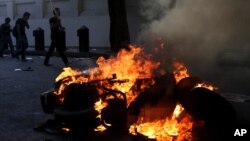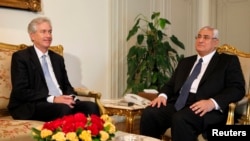WASHINGTON —
U.S. officials and Middle East experts are closely monitoring the situation in Egypt, where they are concerned about possible violence during rival pro- and anti-government demonstrations expected Friday.
The concerns heightened this week when Egypt's military leader, General Abdel Fattah el-Sissi, called for mass street demonstrations to showcase strong popular support of the military's planned campaign to stamp out what it said was violence and terrorism.
"Please, shoulder your responsibility with me, your army and the police, and show your numbers and steadfastness in the face of what is going on," el-Sissi said.
Sissi's call came on a day in which 12 people died in clashes between Muslim Brotherhood supporters of deposed president Mohamed Morsi and those backing his ouster by the military.
Jen Psaki, the State Department spokesperson, summed up U.S. concerns over the situation in Egypt.
“We reiterate our call, which we have done publicly a number of times, but also in private conversations with him [Sissi] and others, on all participants, that all demonstrations be peaceful,” Psaki said. “We are concerned that clashes would make it very difficult to reconcile and get ahead of cycles of unrest and instability.”
As a signal of its concern, the Obama administration announced it was delaying the planned delivery of four F-16 fighter jets earmarked for Egypt. The broader question of continuing Washington's $1.3 billion in annual military assistance was not addressed.
US public opinion favors low-profile Washington role
American public opinion, meanwhile, clearly favored an arms-length stance with Cairo.
“Right now, with such a highly uncertain political environment in Egypt, the less we do or say, the better off we are,” said pollster James Zogby.
But Washington, said Zogby, needs to articulate an overall position on the Egyptian situation because the lack of such a vision has led each side in Egypt to conclude that Washington is backing the other.
A sign of this distrust came earlier this month when U.S. Deputy Secretary of State William Burns visited Cairo, and both anti-Islamist and pro-Muslim Brotherhood leaders refused to meet with him. Burns was able to meet only with the country's military leaders and the civilians they appointed.
Possibly because of such distrust and the fast moving developments in Cairo, most Middle East experts in the United States generally agree that Washington should be cautious in dealing with Egypt for the time being.
Despite the tense situation, Dennis Ross, former National Security Council senior director for the region and long-time Middle East negotiator, told a U.S. Senate hearing this week that Washington had to maintain its leverage over events in Egypt.
“It makes sense for us to stay in the game and try to affect Egypt’s course, and not make a statement that will render us largely irrelevant as Egyptians shape an uncertain future,” Ross said, adding that Washington should make Egyptian leaders understand that continued U.S. economic and military assistance was at stake.
But Shadi Hamid, research director of the Brookings Institution's Doha Center, told a seminar in Washington this week that U.S. aid to Egypt was no longer as influential in Cairo as it used to be because Arab Gulf nations had already pledged $12 billion to the country's new government.
Steven Clemons, a senior fellow at the Washington-based New America Foundation, said Washington could get back some of its former influence by restructuring its aid package.
“Triple the economic portion of U.S. aid and cut the military aid for a period of time,” Clemons told the same Washington seminar this week. He said that restructuring would signal to the leaders in Cairo that Washington was supporting the welfare of the Egyptian people, not necessarily the latest leadership group.
The concerns heightened this week when Egypt's military leader, General Abdel Fattah el-Sissi, called for mass street demonstrations to showcase strong popular support of the military's planned campaign to stamp out what it said was violence and terrorism.
"Please, shoulder your responsibility with me, your army and the police, and show your numbers and steadfastness in the face of what is going on," el-Sissi said.
Sissi's call came on a day in which 12 people died in clashes between Muslim Brotherhood supporters of deposed president Mohamed Morsi and those backing his ouster by the military.
Jen Psaki, the State Department spokesperson, summed up U.S. concerns over the situation in Egypt.
“We reiterate our call, which we have done publicly a number of times, but also in private conversations with him [Sissi] and others, on all participants, that all demonstrations be peaceful,” Psaki said. “We are concerned that clashes would make it very difficult to reconcile and get ahead of cycles of unrest and instability.”
As a signal of its concern, the Obama administration announced it was delaying the planned delivery of four F-16 fighter jets earmarked for Egypt. The broader question of continuing Washington's $1.3 billion in annual military assistance was not addressed.
US public opinion favors low-profile Washington role
American public opinion, meanwhile, clearly favored an arms-length stance with Cairo.
A new public opinion poll conducted by Zogby Research Services (ZRS) gauged the opinions of 1,014 likely U.S. voters between July 12 and July 13. It concluded that Americans’ negative attitudes toward the Muslim Brotherhood in Egypt climbed to 61 percent, and that 63 percent of Americans want Washington to stay out of the dispute between the Islamist movement and protestors backed by the military.
“Right now, with such a highly uncertain political environment in Egypt, the less we do or say, the better off we are,” said pollster James Zogby.
But Washington, said Zogby, needs to articulate an overall position on the Egyptian situation because the lack of such a vision has led each side in Egypt to conclude that Washington is backing the other.
A sign of this distrust came earlier this month when U.S. Deputy Secretary of State William Burns visited Cairo, and both anti-Islamist and pro-Muslim Brotherhood leaders refused to meet with him. Burns was able to meet only with the country's military leaders and the civilians they appointed.
Possibly because of such distrust and the fast moving developments in Cairo, most Middle East experts in the United States generally agree that Washington should be cautious in dealing with Egypt for the time being.
Despite the tense situation, Dennis Ross, former National Security Council senior director for the region and long-time Middle East negotiator, told a U.S. Senate hearing this week that Washington had to maintain its leverage over events in Egypt.
“It makes sense for us to stay in the game and try to affect Egypt’s course, and not make a statement that will render us largely irrelevant as Egyptians shape an uncertain future,” Ross said, adding that Washington should make Egyptian leaders understand that continued U.S. economic and military assistance was at stake.
But Shadi Hamid, research director of the Brookings Institution's Doha Center, told a seminar in Washington this week that U.S. aid to Egypt was no longer as influential in Cairo as it used to be because Arab Gulf nations had already pledged $12 billion to the country's new government.
Steven Clemons, a senior fellow at the Washington-based New America Foundation, said Washington could get back some of its former influence by restructuring its aid package.
“Triple the economic portion of U.S. aid and cut the military aid for a period of time,” Clemons told the same Washington seminar this week. He said that restructuring would signal to the leaders in Cairo that Washington was supporting the welfare of the Egyptian people, not necessarily the latest leadership group.









